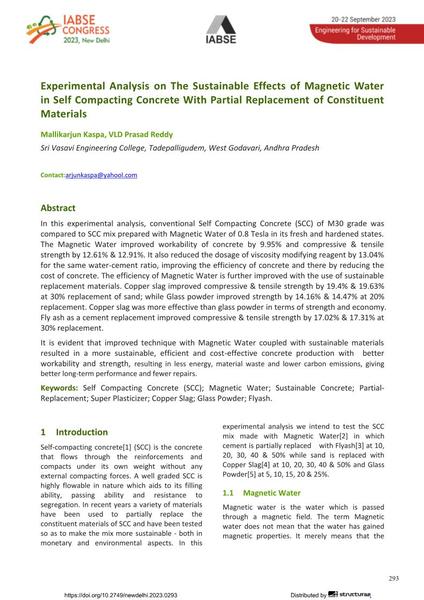Experimental Analysis on The Sustainable Effects of Magnetic Water in Self Compacting Concrete With Partial Replacement of Constituent Materials

|
|
|||||||||||
Bibliografische Angaben
| Autor(en): |
Mallikarjun Kaspa
(Sri Vasavi Engineering College, Tadepalligudem, West Godavari, Andhra Pradesh)
V. L. D. Prasad Reddy (Sri Vasavi Engineering College, Tadepalligudem, West Godavari, Andhra Pradesh) |
||||
|---|---|---|---|---|---|
| Medium: | Tagungsbeitrag | ||||
| Sprache(n): | Englisch | ||||
| Tagung: | IABSE Congress: Engineering for Sustainable Development, New Delhi, India, 20-22 September 2023 | ||||
| Veröffentlicht in: | IABSE Congress New Delhi 2023 | ||||
|
|||||
| Seite(n): | 293-302 | ||||
| Anzahl der Seiten (im PDF): | 10 | ||||
| DOI: | 10.2749/newdelhi.2023.0293 | ||||
| Abstrakt: |
In this experimental analysis, conventional Self Compacting Concrete (SCC) of M30 grade was compared to SCC mix prepared with Magnetic Water of 0.8 Tesla in its fresh and hardened states. The Magnetic Water improved workability of concrete by 9.95% and compressive & tensile strength by 12.61% & 12.91%. It also reduced the dosage of viscosity modifying reagent by 13.04% for the same water-cement ratio, improving the efficiency of concrete and there by reducing the cost of concrete. The efficiency of Magnetic Water is further improved with the use of sustainable replacement materials. Copper slag improved compressive & tensile strength by 19.4% & 19.63% at 30% replacement of sand; while Glass powder improved strength by 14.16% & 14.47% at 20% replacement. Copper slag was more effective than glass powder in terms of strength and economy. Fly ash as a cement replacement improved compressive & tensile strength by 17.02% & 17.31% at 30% replacement. It is evident that improved technique with Magnetic Water coupled with sustainable materials resulted in a more sustainable, efficient and cost-effective concrete production with better workability and strength, resulting in less energy, material waste and lower carbon emissions, giving better long-term performance and fewer repairs. |
||||
| Stichwörter: |
nachhaltiger Beton
|
||||
